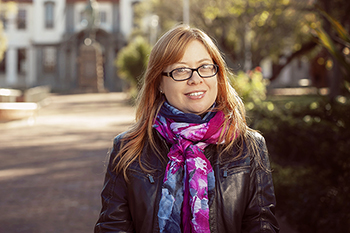Latest News Archive
Please select Category, Year, and then Month to display items
09 November 2018
|
Story Charlene Stanley
|
Photo Charlene Stanley
 Dr Tseliso Ntili, HOD of the Free State Department of Water and Sanitation, warns that pollution caused by mismanagement of municipal water-treatment works puts severe pressure on the province’s water security.
Dr Tseliso Ntili, HOD of the Free State Department of Water and Sanitation, warns that pollution caused by mismanagement of municipal water-treatment works puts severe pressure on the province’s water security.
“Despite our water challenges, Bloemfontein will never become a second Cape Town.” This firm assurance was given by Dr Tseliso Ntili, HOD of the Free State Department of Water and Sanitation, during his presentation at the recent regional seminar of the Faculty of Law’s Environmental Law Association.
The theme of the seminar was Water Quality and Water Security in Bloemfontein and was attended by staff and students from the Faculty of Law and the Faculty of Natural and Agricultural Sciences, as well as relevant role players from private, business, and government sectors.
Not enough water for city’s needs
Water restrictions in some form do seem to remain part of our future landscape though, as Dr Ntsili explained that the city’s current water yield of 218 megalitres per day still fell short of the demand of 259 megalitres per day.
Pollution and mismanagement at municipal level
He pointed out that a big cause for concern was that 75% of the Free State’s waste-water treatment works were dysfunctional. Housekeeping and security at these plants are often severely neglected. Yet, it is difficult for the Department of Water and Sanitation to act against offending municipalities.
“In intra-governmental disputes, the courts must be satisfied that organs of state have taken all reasonable steps to settle contentions – which can be a time-consuming process,” he explained.
Dr Ntsili said that the Caledon River System’s dwindling water levels due to low rainfall and siltation was also a concern, but that plans were underway to supplement the water supply to Bloemfontein via the Gariep Dam by 2026.
However, he warned that poor water management could drastically affect these long-term plans.
“If we can’t manage pollution, the cost will be high. Water security will be challenged, and we will have water shortages – not because of drought, but because of negligence.”
Leading African Studies scholar to represent UFS as research fellow at Leiden University
2016-03-10

Dr Stephanie Cawood to devote three months at the African Studies Centre Leiden as a visiting research fellow to further her research on the rhetorical imprint of Nelson Mandela.
Photo: Supplied |
Dr Stephanie Cawood, Programme Director and Senior Lecturer at the University of the Free State (UFS) Centre for Africa Studies has been offered a visiting research fellowship to the African Studies Centre Leiden (ASCL) at Leiden University in the Netherlands. The ASCL is entirely devoted to the study of Africa transcending multiple faculties and is known for its extensive library.
As a visiting research fellow from April to June 2016, Dr Cawood looks forward to expanding her network as well as intellectual horizons with the broad spectrum of knowledge archived by the ASCL. “Working so closely with the scholars at the African Studies Centre Leiden will enrich my research and broaden my international footprint as a scholar,” Dr Cawood says.
Her research at ASCL follows on her doctoral research on the former president of South Africa, Nelson Mandela’s rhetorical imprint, and will explore the conceptual, cultural, ideological and historical influences that shaped the thought and rhetoric of Nelson Mandela. She is particularly interested in studying the intertextual dynamics in Mandela’s rhetoric with historical figures such as Jawarharlal Nehru, Martin Luther King Jr and Winston Churchill.
According to Dr Cawood, this research “will deepen the understanding of Nelson Mandela’s rhetorical journey from struggle to liberation and unpack the various influences that made him the political figure he ultimately became.”
During her tenure at Leiden University, Dr Cawood will prepare a manuscript to be published by the ASCL as a working paper and also present seminars.